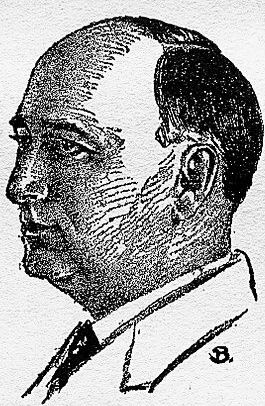David H. Keller
David Henry Keller (December 23, 1880 – July 13, 1966) was an American writer known primarily for his contributions to the genre of science fiction. Despite his prolific output in science fiction, Keller was also a psychiatrist by profession, which influenced much of his writing. His work often explored themes of psychology, with a particular focus on the impact of future societies and technologies on the human mind.
Biography[edit | edit source]
David H. Keller was born in Philadelphia, Pennsylvania. He pursued a career in medicine, specializing in psychiatry, a field that would later deeply influence his science fiction narratives. Keller's unique blend of scientific knowledge and speculative fiction allowed him to explore complex themes such as identity, morality, and the human condition through the lens of futuristic and often dystopian settings.
Throughout his career, Keller contributed numerous short stories and novels to the science fiction genre. His stories were frequently published in pulp magazines of the early 20th century, such as Weird Tales and Amazing Stories. Keller's medical background provided a foundation for his speculative explorations of mental health and societal issues within his fiction.
Major Works[edit | edit source]
Among Keller's most notable works is The Human Termites, a story published in Wonder Stories in 1929. This tale, which depicts a society living unknowingly under the control of a superior alien species, is often cited as an early example of the blending of psychological themes with science fiction. Another significant work, The Eternal Conflict (1932), explores the psychological turmoil of immortality, showcasing Keller's interest in the deeper aspects of human psychology.
Keller's contributions to science fiction were not limited to short stories. He also authored several novels and essays that delved into speculative psychology and the potential futures of humanity. His works often questioned the ethical implications of scientific advancements and their impact on individual identity and societal structures.
Legacy[edit | edit source]
David H. Keller's influence on science fiction is marked by his ability to intertwine his medical knowledge with speculative storytelling. His exploration of psychological and societal themes within the context of science fiction paved the way for future writers in the genre to explore similar topics. Keller's work remains a significant part of the science fiction canon, offering insight into early 20th-century perspectives on technology, psychology, and the future of humanity.
Despite his contributions to the genre, Keller is not as widely recognized today as some of his contemporaries. However, his work continues to be studied for its pioneering exploration of themes that remain relevant in modern science fiction.
See Also[edit | edit source]
Search WikiMD
Ad.Tired of being Overweight? Try W8MD's physician weight loss program.
Semaglutide (Ozempic / Wegovy and Tirzepatide (Mounjaro / Zepbound) available.
Advertise on WikiMD
|
WikiMD's Wellness Encyclopedia |
| Let Food Be Thy Medicine Medicine Thy Food - Hippocrates |
Translate this page: - East Asian
中文,
日本,
한국어,
South Asian
हिन्दी,
தமிழ்,
తెలుగు,
Urdu,
ಕನ್ನಡ,
Southeast Asian
Indonesian,
Vietnamese,
Thai,
မြန်မာဘာသာ,
বাংলা
European
español,
Deutsch,
français,
Greek,
português do Brasil,
polski,
română,
русский,
Nederlands,
norsk,
svenska,
suomi,
Italian
Middle Eastern & African
عربى,
Turkish,
Persian,
Hebrew,
Afrikaans,
isiZulu,
Kiswahili,
Other
Bulgarian,
Hungarian,
Czech,
Swedish,
മലയാളം,
मराठी,
ਪੰਜਾਬੀ,
ગુજરાતી,
Portuguese,
Ukrainian
Medical Disclaimer: WikiMD is not a substitute for professional medical advice. The information on WikiMD is provided as an information resource only, may be incorrect, outdated or misleading, and is not to be used or relied on for any diagnostic or treatment purposes. Please consult your health care provider before making any healthcare decisions or for guidance about a specific medical condition. WikiMD expressly disclaims responsibility, and shall have no liability, for any damages, loss, injury, or liability whatsoever suffered as a result of your reliance on the information contained in this site. By visiting this site you agree to the foregoing terms and conditions, which may from time to time be changed or supplemented by WikiMD. If you do not agree to the foregoing terms and conditions, you should not enter or use this site. See full disclaimer.
Credits:Most images are courtesy of Wikimedia commons, and templates Wikipedia, licensed under CC BY SA or similar.
Contributors: Prab R. Tumpati, MD

